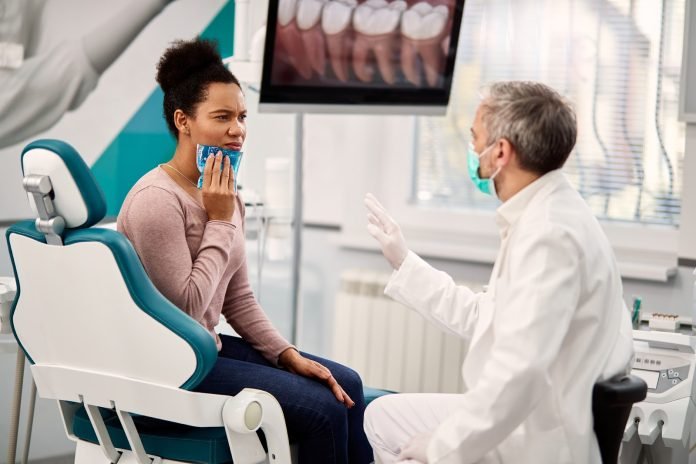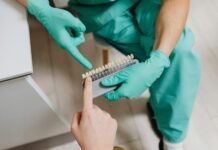
Last Updated on June 4, 2025 by Rida Gul
Table of Contents
Vestibuloplasty Procedure: What Is It?
Before we get into the nitty-gritty of it all, we first need to talk a little bit about vestibuloplasty and what it is. Essentially, this procedure is performed in addition to a more complex treatment plan. It involves the modification of the oral cavity through either tissue rearrangement or alteration of the gingival-mucous membrane.
Vestibuloplasty surgery is performed because of bone tissue loss, and it is necessary. It’s a common procedure for many patients who are interested in getting denture implants or traditional dentures. And you can check it out if you feel interested in learning more about this procedure or perhaps scheduling an appointment.
When Is a Vestibuloplasty Procedure Needed?
As we’ve mentioned, vestibuloplasty surgery is performed as a pre-prosthetic procedure, which means you might need it if you’re getting denture implants, partial dentures, or complete dentures. The purpose of the procedure is to deepen the oral vestibule in order to make more space for your permanent dentures. Also, by widening the area, you’ll also benefit from being able to maintain your oral hygiene in an easier manner.
So, having a shallow vestibule is a recipe for plaque accumulation, and plaque buildup can only be the start of your problems if you’re not careful enough. If plaque buildup gets worse, it can cause a plethora of issues, such as gum inflammation and recession, as well as pockets developing at the base area of your teeth.
Additionally, a shallow vestibule can also be problematic when it comes to dentures. That is because a shallow vestibule cannot hold your dentures in place comfortably and properly. And, even worse, it can prevent the tissues holding your dentures from staying clean, which will definitely lead to an infection.
It’s important to say that not everyone planning to get dentures will necessarily need a vestibuloplasty. However, a mouth examination by a professional is crucial either way. That way, your dentist will be able to determine whether or not your oral cavity is fit to get prosthetic teeth. So, if you do have any discomfort or have noticed problems, you can confide in your dentist, and they can do some additional examinations. If your dentist determines you would benefit from a vestibuloplasty surgery, they will recommend a maxillofacial and oral surgeon.
Things to Expect During a Vestibuloplasty Procedure
A vestibuloplasty procedure is performed using a scalpel or a diode laser, and there are also different techniques we can utilize when performing it. First, let’s discuss the two different methods for this procedure, how they work, and what you can expect from each.
Scalpel Method
This method is rather conventional, and it includes incisions being made in order to separate the connective tissue and certain muscle attachments in the place where cheeks and gums meet, which is right at the base of the teeth. After these incisions are made to make the vestibule area deeper, the cheek will be stitched in the proper location. To help make the healing process quicker, the surgeon will put a tissue graft from a different part of the mouth on top of the incision. Additionally, the grafting of a porcine collagen membrane has also been proven to promote the healing process.
All in all, this procedure has a good healing process, so it’s the right choice for patients who experience difficulties with that.
Diode Laser Method
This method, as mentioned beforehand, uses a diode laser. With the help of the laser, muscle fibers are removed, and the vestibule is widened. When it comes to the healing process, another type of laser might be used to quicken it over the span of several sessions.
The laser method is also known for reduced scarring and the lack of stitches. It’s also the right choice for patients who experience bleeding problems.
How to Handle Aftercare
Aftercare is an important part of any procedure, so it’s necessary to know how to handle it properly. Giving you some basic aftercare advice is the first thing your surgeon will do after the procedure. That will usually involve pain reliever and antibiotics prescriptions, as well as a mouth rinse recommendation. These will help you manage pain and keep plaque away.
Your surgeon will also advise you on keeping the area clean while it heals, what to eat, and even recommend an oral care routine to follow. Additionally, you’ll have follow-up appointments so your surgeon can monitor your healing process. This point is especially important for patients with stitches that need to be removed. And, if you’re one of those patients, you’ll also need to visit your dentist in ten to fourteen days in order to get your stitches taken off.
After approximately a month, the healing process should be finalized, and the vestibule will be deeper as well.
Getting Your Replacement Teeth
Now’s the time for the most important part – the prosthetic teeth. First, it’s important to note that this process may seem rather confusing. That is due to the fact that your denture construction may actually take place before your vestibuloplasty. If that happens, your dentist will simply refit the dentures so that they match up with the post-surgery composition of your mouth.
The second option is to wait after the surgery and fit the dentures to your mouth’s new shape after it has fully healed. So, the process would ideally begin a month after your vestibuloplasty.
That is simply the usual timeline. However, it can all depend on the healing process, so be sure to follow all the instructions your dentist gives you. Lastly, understanding the procedure and being responsible for how you follow the instructions is key to beginning your dentures journey on a good note. Essentially, all you need to do is be responsible and committed, and your dental professionals will handle all the rest.
Apart from that, if you are interested to know about Is it safe to get dental implants abroad? then visit our Health category.















